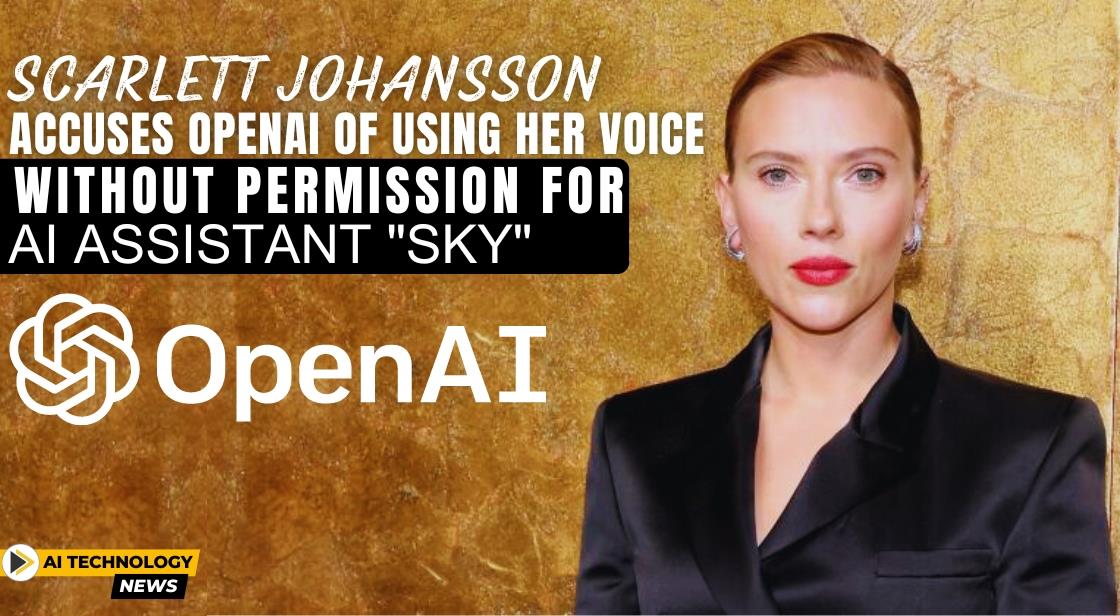Scarlett Johansson Accuses OpenAI of Using Her Voice Without Permission for AI Assistant "Sky"

News Synopsis
Scarlett Johansson may be the latest artist to sue Sam Altman-led OpenAI. The reason? OpenAI apparently used her voice for their AI voice assistant, despite her clear refusal to be a part of the project.
Controversial GPT-4o-Powered ChatGPT
OpenAI made significant headlines last week with the introduction of its GPT-4o-powered ChatGPT, showcasing an advanced conversational interface. Observers quickly noted that the voice assistant, named Sky, sounded remarkably similar to the AI assistant from the movie Her, portrayed by Scarlett Johansson.
Suspicions and References to Her
Further raising eyebrows were the constant references to the film during OpenAI's demos. This led many to believe that Johansson's AI character from Her had influenced the development of GPT-4o. According to a report, Johansson claimed that OpenAI had approached her last September, inviting her to provide ChatGPT's new voice. However, she declined the offer.
Johansson's Shock and Legal Action
When Scarlett Johansson discovered how similar Sky's voice was to her character in Her, she was taken aback. She also claimed that Sam Altman reached out to her agents two days before the demo, urging her to reconsider. This attempt was unsuccessful, and Johansson expressed her shock and frustration, especially when Altman tweeted "her" on May 13.
Upon seeing the demo, Johansson hired legal counsel to demand an explanation from OpenAI regarding the creation of Sky's voice.
OpenAI's Response and Suspension of Sky
In response to Johansson's notice, OpenAI suspended the use of Sky. The company posted a blog outlining the creation process for the voice, stating, "Sky's voice is not an imitation of Scarlett Johansson but belongs to a different professional actress using her own natural speaking voice."
Development and Deployment of Sky
Last September, OpenAI introduced Sky as one of several synthetic voices for ChatGPT. However, during the recent event, Sky's voice demonstrated a much more natural intonation with emotional nuances. In the demonstration, a version of ChatGPT powered by GPT-4o was showcased, engaging in what appeared to be flirtatious conversation with an OpenAI engineer.
Clarification from Sam Altman
Sam Altman emphasized in a statement that Sky's voice was never intended to mimic Scarlett Johansson's and that the voice actor for Sky was hired before any contact with Johansson. In recognition of Johansson's concerns, OpenAI halted the use of Sky's voice in their products as a gesture of respect. Altman expressed regret for the lack of clear communication with Johansson and apologized for any misunderstanding.
Broader Context: Legal Disputes and Ethical Concerns
OpenAI's dispute with Scarlett Johansson adds to its ongoing legal challenges with artists, writers, and other creatives. The company is currently facing multiple lawsuits alleging unauthorized use of copyrighted material to train its algorithms, including actions from The New York Times and authors like George R.R. Martin.
The rise of generative AI has made creating realistic synthetic voices significantly easier, presenting both opportunities and risks. For example, in January, voters in New Hampshire received robocalls featuring a deepfake voice message purportedly from Joe Biden. In March, OpenAI revealed the development of technology capable of replicating someone's voice from a short 15-second clip but decided against releasing it due to potential misuse concerns.
OpenAI's Legal Troubles and the Rise of Generative AI
This incident is not the first time OpenAI has faced legal challenges regarding copyrighted material. The company is currently embroiled in lawsuits with The New York Times and authors like George R.R. Martin, who allege unauthorized use of their works to train OpenAI's algorithms.
The rise of generative AI technology has made creating realistic synthetic voices much simpler, presenting both opportunities and risks. For instance, deepfake voice messages have been used in political robocalls, and OpenAI itself developed technology to replicate voices from short audio clips, ultimately choosing not to release it due to potential misuse.
Conclusion
The controversy surrounding Scarlett Johansson's potential lawsuit against OpenAI highlights the ethical and legal complexities of AI voice replication. While AI technologies like GPT-4o hold immense promise for advancing conversational interfaces and accessibility, they also raise significant questions about consent, intellectual property, and the ethical use of synthetic voices. As generative AI continues to evolve, it is crucial for companies to navigate these challenges carefully, ensuring clear communication and respect for individual rights.









